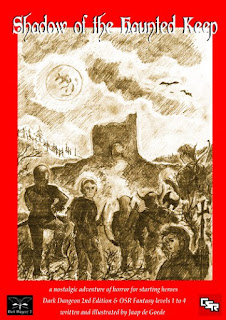Sometimes you may feel uncomfortable with true sandboxing. But you don't want to do a linear plot either. Perhaps you want to give some choice to the players, but you're not sure how to do so without losing control of the story. If so, you might experiment with semi-non-linear stories.
Many computer adventures, and pick-your-path-to-adventure books are built this way. They are actually connected scenes (or rooms), which branch out into other scenes, and sometimes branch back to a main story line. The diagram below should give an idea how that works.
------\ ---E--\
/ \ / \
A--->B--->C--->D--->F
\ /
-------/
Scene A will either lead to scene B or C, scene B will lead to scene C or D, scene C will lead to scene D or E, and scene D and E will both lead to F. So depending on what the players do, their adventures will look different, but they'll start out at A, and end up at F. Scene A could be the escape of a criminal at the scaffold, scene B their chase after his rescuers, scene C the discovery that the criminal will try to kill the king, scene D the break in in the criminal's hideout, scene E the warning of the king and building his security, and scene F the confrontation with the criminal as he tries to take out the king.
What's Good about Pick your Path
The good thing about this way of story building is that you actually guarantee that there is a story, while you explore some possible choices the heroes should, or can make. You may actually get more grip on what you'll be doing at the game table. If you make a diagram before you start play, you'll actually be forced to think about what the players might want to do, and what that will lead to.
In addition, if they indeed take one of the paths you thought up beforehand, you'll be more prepared. And if your players are at a loss which way to go, it may be easier to present choices or leads to them, for the direct actions they can take. So, it can help you to be a more focused game master.
Still, Don't get Stuck in your own Diagram
Exactly where its strength lies, there also lies its weakness. You start out at A, and you end up at F no matter what you do. If the game master did not plan for X, Y or Z, that's a hard place to get to. Or at least you'll drop out of the prepared adventure if you force your way to X, Y or Z. A pick your path is still very limited in its choices, even if it's not entirely linear anymore. Sure, you could make an adventure that can end up either at F, G or H. But ending up in a place the GM didn't think of before is not a possibility you can build in.
The thing to watch for then, is that you don't get tempted to push players through your preordained diagram, when they don't want to be pushed. Be prepared to think on your toes, and ready to draw entirely new routes and scenes. Or be prepared to think of new hooks to draw them into the scenes you thought of. Either way, still beware of railroading, semi-linear or not.
A Special Case of Semi-Linear: The Dungeon
A very classic example of this way of making an adventure is the Dungeon. A group of interconnected rooms, branching different ways, and reconnecting elsewhere. Each room can be a scene, however short or simple. It can be a fight, a trap, a rest and recovery, or a role playing encounter. A dungeon with multiple paths to its core treasure room, or the room with the big boss is very much a pick your path to adventure. That's exactly what this is about.
And the Dungeon has the similar advantages and pitfalls. Mapping out a Dungeon will make sure there is some focus on where to go next. And a limitation on where to go next. You either go in deeper, whichever way is open, or perhaps you can pull out back to the surface, but that's it.
Adversely, the Dungeon may be to hard for the party to tackle. Perhaps you put in a trap that is too deadly, or a group of adversaries that is to hot to handle. Then what? You can get quite stuck. Here too, you may have to improvise, and open new avenues to make the adventure last. Maybe the heroes get unexpected help from another group of NPC delvers. Maybe a renegade monster opens new opportunity as it triggers a trap barring the way. Maybe you let the heroes discover a secret passage that wasn't there yet when you first drew the dungeon – or you let them dig one of their own.
With Dungeons too, you don't have to be stifled by your own pre-set semi-linearity. Either way, whether you use a story diagram or a have a straight dungeon, feel free to improvise when stuck, and you have a great tool to run adventures.
 Possibly this one needs no introduction to you, as this one won this year's ENnie award. I'll chance that.
Possibly this one needs no introduction to you, as this one won this year's ENnie award. I'll chance that.














